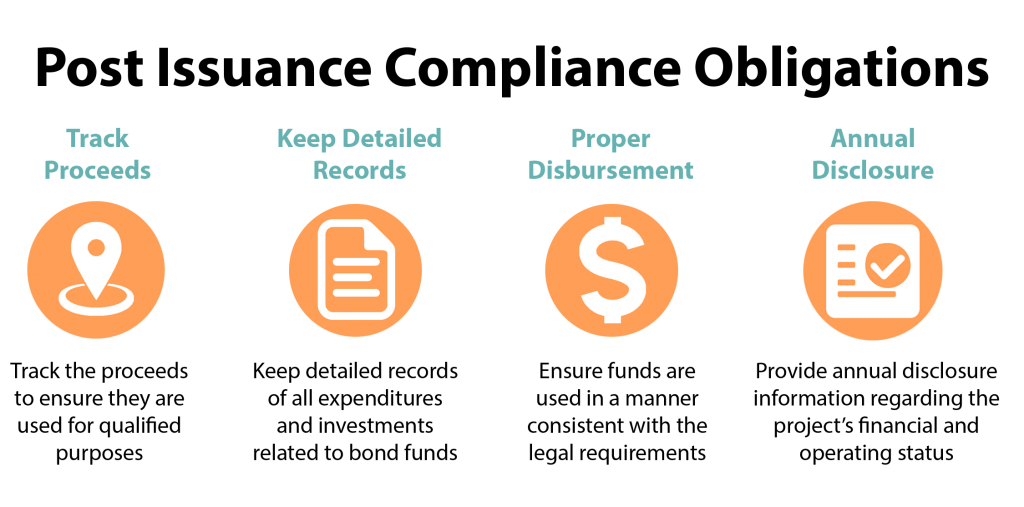Following issuance of tax-exempt bonds, the borrower has several obligations required under federal tax rules and covenants with investors. Borrower charter schools must be aware of and comply with these obligations.

Tax Compliance
It is essential that borrowers develop and maintain a robust post issuance compliance program to track their compliance with all applicable requirements.
The Internal Revenue Service (IRS) recommends that material tax records be retained for the life of a bond issue, plus three years.
Borrowers with effective post issuance policies and procedures can more successfully respond to IRS inquiries.
The most important step in a compliance monitoring program is to consult with members of the finance team, including bond counsel, at the time of bond issuance to determine the borrower’s obligations. Compliance responsibilities last, at minimum, for the length of the bond term.
Continuing Disclosure Requirements
Borrowers generally have an obligation to meet specific continuing disclosure standards set forth in continuing disclosure agreements (CDAs, also called continuing disclosure certificates or undertakings). Issuers enter into CDAs at the time of bond issuance to enable their underwriters to comply with Securities and Exchange Commission (SEC) Rule 15c2-12.
Subject to limited exceptions, when bonds are issued and publicly-offered, the Issuer enters into a CDA. Under these contractual agreements, the Issuer commits to provide to the marketplace certain financial information and notices of listed events.
The SEC’s Municipalities Continuing Disclosure Cooperation (MCDC) initiative in 2014, along with other recent federal regulatory actions, have highlighted the importance of maintaining a reliable system to adequately manage continuing disclosure. Failure to comply with CDAs may impair the issuer’s access to the public capital markets in a timely manner as underwriters must have a reasonable basis for believing that the issuer will meet their CDA obligations.
Read more: https://www.gfoa.org/materials/understanding-your-continuing-disclosure-responsibilities.
Other Post Issuance Compliance Requirements
After issuance of the bonds, charter school borrowers must also maintain certain contractual bond covenants and additional disclosures which may include, but not limited to:
- Maintaining certain levels of liquidity;
- Maintaining certain levels of net revenue sufficient to cover debt obligations;
- Maintaining certain reserve fund balances and/or repair and replacement funds;
- Complying with restrictions on incurrence of additional debt or property liens;
- Maintaining bond ratings;
- Providing quarterly or annual updates to investors on the school's financial performance; and
- Other restrictions and compliance requirements.
Bond counsel and the school’s municipal advisor will advise the school on these additional obligations in detail prior to the closing of the bonds.
Other Resources
Below are a number of useful links to various resources on the topic of post issuance compliance.
- Internal Revenue Service’s site for the tax-exempt bond community:
https://www.irs.gov/tax-exempt-bonds - Internal Revenue Service publication discussing the post issuance compliance responsibilities of borrowers:
http://www.irs.gov/pub/irs-tege/bonds_act_0607.pdf - Post Issuance Compliance checklist provided by the Government Finance Officers Association (GFOA) and the National Association of Bond Lawyers (NABL):
http://www.gfoa.org/downloads/PostIssuanceCompliance.pdf - Best Practices: Understanding Your Continuing Disclosure Responsibilities compiled by the Government Finance Officers Association (GFOA): https://www.gfoa.org/materials/understanding-your-continuing-disclosure-responsibilities
